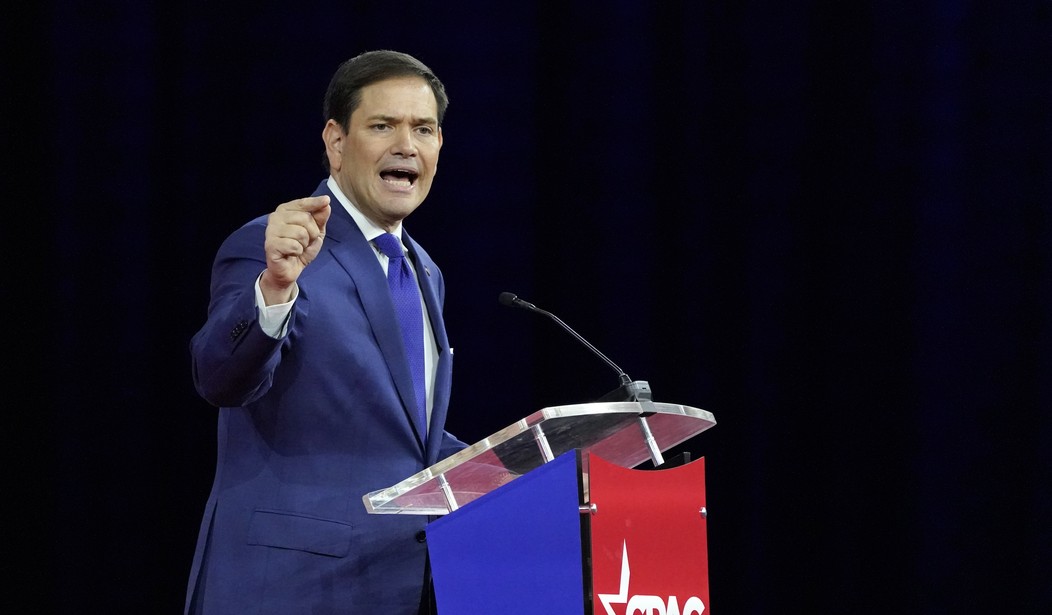Sen. Marco Rubio (R-Fla.) did something recently that is long overdue and that other conservative Republicans in Congress and elsewhere should adopt as standard procedure: he asked reporters some simple probing questions.
The occasion for those questions was a presser with a gaggle of congressional reporters who challenged Rubio’s remarks on abortion and whether he supports any restrictions on the lethal procedure.
They weren’t satisfied when the Florida Republican reminded them that he’s “always been pro-life,” so Rubio challenged the assembled journalists to do the rest of their jobs: “You need to be asking Democrats what restrictions they support. Democrats won’t vote for any restriction of any kind on abortion.”
But rather than simply leaving it there, Rubio, knowing none of the reporters were likely to take up his challenge, directed his staff to fire off some questions of their own for a bunch of journalists, according to a September 20 statement.
The Rubio staffers “emailed 55 different reporters from 40 major news outlets — including the largest newspapers in Florida and 20 largest in the nation — to find out if they or their colleagues had ever asked federally elected Democrats real questions about abortion,” according to the statement.
I’m betting you can guess how the reporters responded. Right: very few of them did, according to the statement, and those who did got an attitude about it all:
• One reporter responded to the survey within minutes, writing, “I have asked those questions.” When asked for links to include in the report, the same reporter went silent.
• Another reporter asked, “Why does a public official think it’s ok to ask questions to news organizations on this issue?” and proceeded to exchange multiple emails without answering any questions.
• Business Insider went so far as to write a 370-word article about the “combative” inquiry but steadfastly refused to address any of the questions.
Frankly, the only element of those responses and non-responses that surprises me is that Rubio’s staffers didn’t receive more outraged protests along the line of, “How dare you think you have the right to challenge us about how we do our jobs?”
Rubio then cited the responses as evidence of two critical problems with the national media:
“This highlights two major problems we have in this country. First, reporters believe no one is allowed to ask them questions. They take offense at the idea that you, me, or anyone else should dare to question the sanctity of their reporting. That arrogant, dismissive attitude is exactly why there is a crisis of confidence in our nation’s news outlets. They truly think they are better than everyone else.
“Second, Democrats get away with murder, literally. They are never pushed to answer specific questions about where they stand on the taking of human life. The truth is that every single Democrat supports taxpayer-funded abortion without any restrictions up until the moment a child is born. That is the truth, but Democrats never have to explain their radical position, because the press is all too willing to cover for them.”
Rubio is right in his assessment of journalists’ vanished credibility, and his direction to his staff to turn the tables is exactly the right precedent. Speaking as a journalist who has covered Congress, the White House, and the national political and public policy scenes for more than three decades, I wonder if Rubio didn’t go far enough.
For decades, presidents and members of Congress rarely publicly challenged how they were being covered by journalists. Sure, back in the office talking to staffers or to colleagues elsewhere, they let loose. But, generally speaking, a respectful public attitude about the institution of the news media was maintained that minimized the unavoidable friction.
But then came the Steele dossier, the Ukraine call, and a hundred other sensational anti-Trump tirades based on little more than innuendo, misrepresentations, and questionable sourcing. What had for a decade or more been obvious to the honest observer suddenly was out in the open for all to see during and after the 2016 presidential campaign and then throughout the entirety of the Trump administration.
All by itself, the reporting by the journalists covering the Trump-Russia conspiracy hoax and, let’s not forget, the work of their editors as well, left the credibility of the major media in tatters, especially the New York Times, the Washington Post, USA Today, AP, the networks, MSNBC, and CNN.
The Steele dossier was a hoax paid for by Hillary Clinton’s 2016 campaign and pushed by partisan liars in government. But when was the last time you saw a correction in the Times or the Post of even one of their many “scoops” that now are clearly seen as having been based on falsehoods? And when will those Russia-hoax Pulitzers be returned? Or demanded back by the Pulitzer committee?
There’s no longer any reason for officials in either party not to challenge journalists of all stripes with questions about how they cover the news. Just as politicians must be held accountable, so must journalists who peddle stories based on demonstrable falsehoods.










Join the conversation as a VIP Member